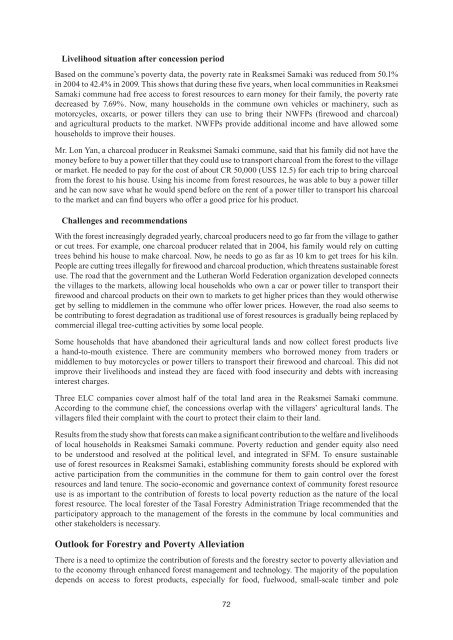Contribution of Forestry to Poverty Alleviation - APFNet
Contribution of Forestry to Poverty Alleviation - APFNet
Contribution of Forestry to Poverty Alleviation - APFNet
Create successful ePaper yourself
Turn your PDF publications into a flip-book with our unique Google optimized e-Paper software.
Livelihood situation after concession period<br />
Based on the commune’s poverty data, the poverty rate in Reaksmei Samaki was reduced from 50.1%<br />
in 2004 <strong>to</strong> 42.4% in 2009. This shows that during these five years, when local communities in Reaksmei<br />
Samaki commune had free access <strong>to</strong> forest resources <strong>to</strong> earn money for their family, the poverty rate<br />
decreased by 7.69%. Now, many households in the commune own vehicles or machinery, such as<br />
mo<strong>to</strong>rcycles, oxcarts, or power tillers they can use <strong>to</strong> bring their NWFPs (firewood and charcoal)<br />
and agricultural products <strong>to</strong> the market. NWFPs provide additional income and have allowed some<br />
households <strong>to</strong> improve their houses.<br />
Mr. Lon Yan, a charcoal producer in Reaksmei Samaki commune, said that his family did not have the<br />
money before <strong>to</strong> buy a power tiller that they could use <strong>to</strong> transport charcoal from the forest <strong>to</strong> the village<br />
or market. He needed <strong>to</strong> pay for the cost <strong>of</strong> about CR 50,000 (US$ 12.5) for each trip <strong>to</strong> bring charcoal<br />
from the forest <strong>to</strong> his house. Using his income from forest resources, he was able <strong>to</strong> buy a power tiller<br />
and he can now save what he would spend before on the rent <strong>of</strong> a power tiller <strong>to</strong> transport his charcoal<br />
<strong>to</strong> the market and can find buyers who <strong>of</strong>fer a good price for his product.<br />
Challenges and recommendations<br />
With the forest increasingly degraded yearly, charcoal producers need <strong>to</strong> go far from the village <strong>to</strong> gather<br />
or cut trees. For example, one charcoal producer related that in 2004, his family would rely on cutting<br />
trees behind his house <strong>to</strong> make charcoal. Now, he needs <strong>to</strong> go as far as 10 km <strong>to</strong> get trees for his kiln.<br />
People are cutting trees illegally for firewood and charcoal production, which threatens sustainable forest<br />
use. The road that the government and the Lutheran World Federation organization developed connects<br />
the villages <strong>to</strong> the markets, allowing local households who own a car or power tiller <strong>to</strong> transport their<br />
firewood and charcoal products on their own <strong>to</strong> markets <strong>to</strong> get higher prices than they would otherwise<br />
get by selling <strong>to</strong> middlemen in the commune who <strong>of</strong>fer lower prices. However, the road also seems <strong>to</strong><br />
be contributing <strong>to</strong> forest degradation as traditional use <strong>of</strong> forest resources is gradually being replaced by<br />
commercial illegal tree-cutting activities by some local people.<br />
Some households that have abandoned their agricultural lands and now collect forest products live<br />
a hand-<strong>to</strong>-mouth existence. There are community members who borrowed money from traders or<br />
middlemen <strong>to</strong> buy mo<strong>to</strong>rcycles or power tillers <strong>to</strong> transport their firewood and charcoal. This did not<br />
improve their livelihoods and instead they are faced with food insecurity and debts with increasing<br />
interest charges.<br />
Three ELC companies cover almost half <strong>of</strong> the <strong>to</strong>tal land area in the Reaksmei Samaki commune.<br />
According <strong>to</strong> the commune chief, the concessions overlap with the villagers’ agricultural lands. The<br />
villagers filed their complaint with the court <strong>to</strong> protect their claim <strong>to</strong> their land.<br />
Results from the study show that forests can make a significant contribution <strong>to</strong> the welfare and livelihoods<br />
<strong>of</strong> local households in Reaksmei Samaki commune. <strong>Poverty</strong> reduction and gender equity also need<br />
<strong>to</strong> be unders<strong>to</strong>od and resolved at the political level, and integrated in SFM. To ensure sustainable<br />
use <strong>of</strong> forest resources in Reaksmei Samaki, establishing community forests should be explored with<br />
active participation from the communities in the commune for them <strong>to</strong> gain control over the forest<br />
resources and land tenure. The socio-economic and governance context <strong>of</strong> community forest resource<br />
use is as important <strong>to</strong> the contribution <strong>of</strong> forests <strong>to</strong> local poverty reduction as the nature <strong>of</strong> the local<br />
forest resource. The local forester <strong>of</strong> the Tasal <strong>Forestry</strong> Administration Triage recommended that the<br />
participa<strong>to</strong>ry approach <strong>to</strong> the management <strong>of</strong> the forests in the commune by local communities and<br />
other stakeholders is necessary.<br />
Outlook for <strong>Forestry</strong> and <strong>Poverty</strong> <strong>Alleviation</strong><br />
There is a need <strong>to</strong> optimize the contribution <strong>of</strong> forests and the forestry sec<strong>to</strong>r <strong>to</strong> poverty alleviation and<br />
<strong>to</strong> the economy through enhanced forest management and technology. The majority <strong>of</strong> the population<br />
depends on access <strong>to</strong> forest products, especially for food, fuelwood, small-scale timber and pole<br />
72


